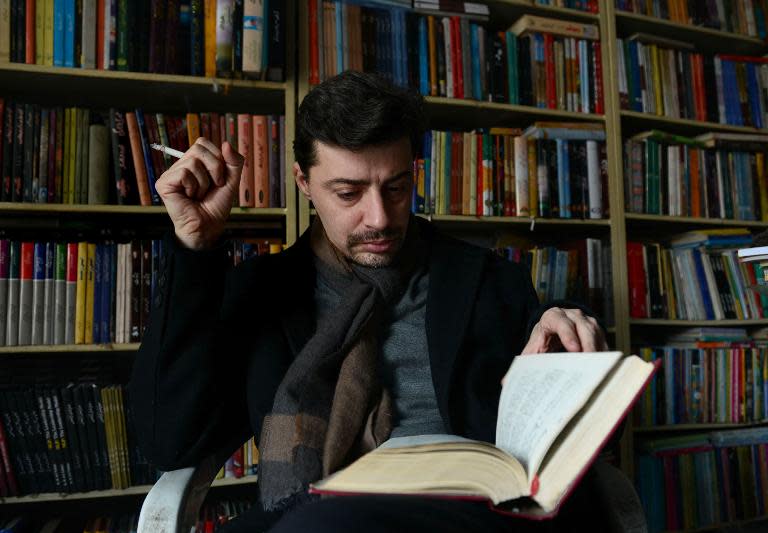Frenchman Julien Columeau arrived in Pakistan at the age of 30 as a humanitarian worker – but his talent for languages and love of books made him one of the country’s most innovative Urdu novelists. He writes mostly historical novels with prose described as lively and powerful. Critics say Columeau, now 41, has breathed new life into a scene that was considered stale. His work has been shown at the country’s most important literary festivals, three novels have been published and more are in the pipeline. A native of Marseille, Columeau left France in 1993 to study Hindi in India. But he quickly became disillusioned with the “clerical” form of the language he was forced to learn and switched to Urdu two years later. “I taught myself – I spoke Hindi at the time, so there was a book on how to transcribe Urdu into Hindi,” he told AFP. “Then I practiced my reading. After about a year, I could read books,” he said. He later moved to Pakistan with the International Committee of the Red Cross, where he worked primarily as a translator in crisis zones. – Poets and Martyrs – Columeau’s first short story in Urdu, Zalzala, or “Earthquake,” appeared after the catastrophic 2005 earthquake and is set between a girls’ school in Pakistani Kashmir and a tower block in Islamabad. But it was not until he turned his attention to iconic Pakistani poets of the 20th century that Columeau found his own writing. He was fascinated by the 1950s poet Saghar Siddiqui, who fell into ruin and poverty and gained a saintly following among common people before his untimely death. “I wanted to find out why he became a malang (a wandering mystic) even though he was a successful poet and wrote songs for films,” Columeau said of his first novel, “Saghar.” “I used the gaps in his biography to construct my own story.” After his death, Siddiqui’s legend grew and a shrine was built to him in the eastern Islamic city of Lahore, which is now visited mainly by the working class and people seeking blessings and inspiration – including Columeau himself. His second book, about the vagrant street poet Mira Jee, received a positive review from 90-year-old Intizar Husain, considered the greatest living Urdu writer and celebrated for his works on the partition of the country and the 10-year dictatorship of Zia-ul-Haq. Husain told AFP that Columeau’s prose – which includes explicit sex scenes and details of drug abuse – was a break from the usual euphemistic style of Urdu literature. “His language goes beyond what we normally say,” Husain said. Over the past decade, English-speaking Pakistani authors have become increasingly prominent and helped put their country on the world stage, with works such as Mohsin Hamid’s The Fundamentalist Who Didn’t Want to Be One – which was made into a film in Hollywood – and Mohammed Hanif’s A Box of Exploding Mangoes. Urdu is known for its beauty and poetry, but its literature has declined in recent years, becoming mainly the domain of Pakistan’s less visible lower middle class. – Novelty factor – Columeau not only pushed boundaries in terms of acceptable prose, but was also willing to tackle sensitive issues such as sectarian violence between Sunnis and Shiites. His third novel, The Martyr Munir Jaffry, is about a Shiite preacher whose father is killed by militants. The book is written as a stream of consciousness and includes references to the Battle of Karbala, a seminal event in Shiite history that many modern followers see as a metaphor for the tragedies of the present. His latest short story collection, meanwhile, features an eclectic cast of characters: a militant who goes on to become a brutal pimp, an evangelical Islamic preacher from Kashmir who gets lost in the jungles of the Amazon where he has gone to convert tribes, and a young Baloch insurgent who emigrates to France after a series of tragedies. It may sound difficult to portray this authentically, but Columeau proves up to the task – perhaps in part because he travelled around the country for the ICRC and met people from marginalised groups. “Nobody understands Pakistan’s subcultures like he does. Captivating,” the English-language author Hanif tweeted about the collection in January. His publisher and editor, Amjad Saleem, said Columeau’s status as an outsider looking in could be an advantage. “There is a difference of civilisation, so Julian’s observations about Pakistani society, his way of understanding and expressing it, are fascinating things for us,” he said. Initially, writing in Urdu as a foreigner was considered something new, and Columeau felt patronised by some readers. “That was an obstacle I had to overcome. People didn’t tell me about my book, its structure, its quality or its shortcomings, but about my language,” he said. Now he hopes to turn the stereotypes on their head. “There are a lot of people from Asia and Africa whose mother tongue is not a Western language, but who write in Western languages. You don’t really get to see the opposite. I would encourage more people to do that.”
French author crosses borders – writes in Urdu

